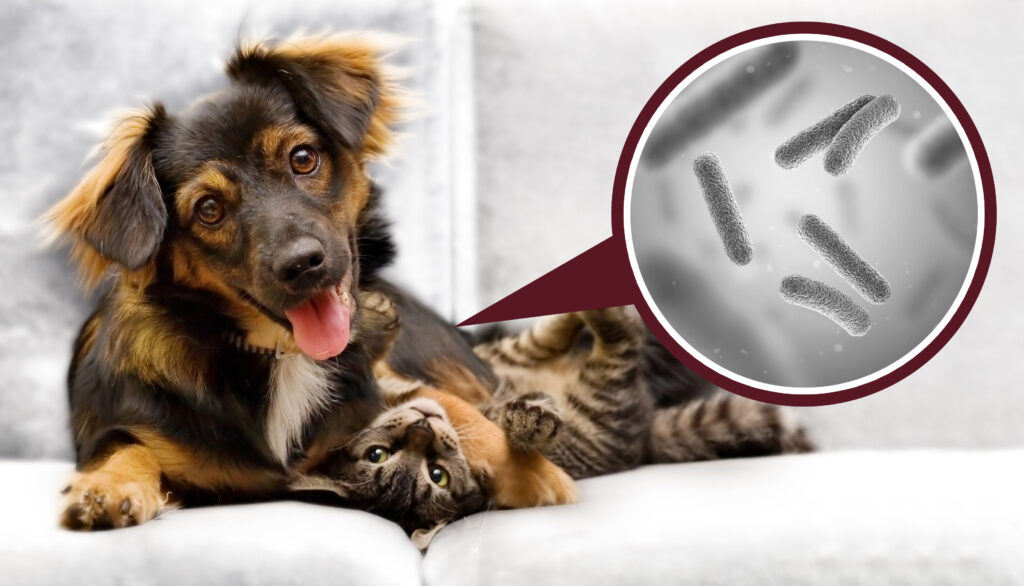Dr. Beverly Wilkinson, DVM – Director of Veterinary Services – Vets Plus, Inc.
As a veterinarian, I am fortunate enough to see the incredible bond between pets and their owners. It’s clear to me that pet owners want nothing but the best for their furry companions, whether that means high-quality food, regular exercise, or frequent medical check-ups. But there’s one area of pet health that is often overlooked – gastrointestinal health, more specifically, the benefits of probiotics.
Just as probiotics have become popular for improving human health, they’re proving to be just as beneficial for pets. In fact, probiotics are now recognized as a key player in maintaining a pet’s overall health, from enhancing digestion to strengthening the immune system. Probiotics can contribute to a longer, happier, and healthier life.
Probiotics are beneficial bacteria that live in the digestive tract and play an important role in maintaining the balance of the intestinal microbiome. This balance is essential for many aspects of a pet’s health, including digestion, immune function, and even mental well-being. The gastrointestinal (GI) tract isn’t just responsible for processing food; it’s home to about 70% of the immune system. So, supporting intestinal health with probiotics can help boost your pet’s immunity, making them more resistant to infections, better able to recover from illnesses, and better able to handle stressful situations.
Many factors can disrupt the balance of bacteria in your pet’s GI tract, such as stress, illness, poor diet, or antibiotic use. When this happens, the bad bacteria can proliferate and overgrow, causing the intestinal flora to become unbalanced. This is called dysbiosis and it can lead to digestive issues, weakened immunity, and even behavioral problems like anxiety or irritability. This is where probiotics step in to restore balance, boost the immune system, and keep your pet in top shape.
Boosting the immune system is an important benefit of probiotics, but there are others. Believe it or not, your pet’s intestinal health can also affect their brain. There is a communication system between the GI tract and the brain called the gut-brain axis (GBA). Think of it like a two-way street, where the GI tract and brain are constantly sending messages back and forth. The bacteria in the GI tract can send signals to the brain, which can influence mood and behavior. Dysbiosis, or an imbalance of the good and bad bacteria, can disrupt the signals to the brain and cause anxiety or other behavioral disorders. Probiotics balance the intestinal microbiome and help reduce symptoms of anxiety, particularly in stressful situations like travel, boarding, or visits to the veterinarian. Having a healthy GI tract can lead to a calmer, happier pet.
Probiotics can also help manage allergies and skin conditions, because they help to modulate the immune system and reduce the body’s tendency to overreact to allergens.
Probiotics aren’t just the latest trend in pet care; they’re backed by solid science. Numerous studies have shown the benefits of probiotics for both dogs and cats. A study published in Veterinary Immunology and Immunopathology found that dogs receiving probiotic supplements had a 35% increase in beneficial intestinal bacteria within six weeks. This led to improved immune responses, making them more resistant to infections. In another study focusing on cats, probiotics were found to significantly reduce symptoms of chronic diarrhea. In fact, 72% of cats showed a marked improvement in their digestive health after being given a probiotic supplement.
Probiotics for pets come in a variety of forms, including powders, capsules, gels, and treats. When choosing a probiotic, make sure it contains live, active cultures and is specifically formulated for pets, as their digestive systems are different from humans’. Not all probiotics are created equal, and it’s important to choose a high-quality, species-specific probiotic that meets your pet’s individual needs from a reliable, trustworthy company. It’s always a good idea to consult with your veterinarian before adding probiotics to your pet’s routine.
As a veterinarian, I understand that pet owners want nothing but the best for their furry family members. Whether it’s improving digestion, boosting immunity, or reducing stress, probiotics offer a wide range of benefits that can make a noticeable difference in your pet’s quality of life. Keeping your pet’s intestinal tract healthy by regularly giving them probiotics is one of the easiest and most effective ways to ensure they live a long, healthy, happy life and gives you more tail wags and couch cuddles. So, the next time you’re considering ways to enhance your pet’s care, don’t overlook the power of probiotics.
References
- Sauter, S. N., et al. (2006). “Probiotics Enhance Immune Responses and Gut Microbiota in Pets.” Veterinary Immunology and Immunopathology, 111(3-4), 175-181.
- Ritchie, L. E., et al. (2010). “Effects of Probiotic Supplementation on the Immune Function of Dogs and Cats.” Journal of Animal Science, 88(7), 238-244.
- “The Role of Probiotics in Pet Health.” (2022). Human Animal Bond Research Institute (HABRI) Study.
- Hart, M.L., et al. (2012). “Open-label Trial of a Multi-strain symbiotic in Cats with Chronic Diarrhea.” Journal of Feline Medicine and Surgery, 14(4), 240-245.
- McGowan, R. T. S., et al. (2018). “Tapping into those ‘gut feelings’: Impact of BL999 (Bifidobacterium longum) on anxiety in dogs.” Veterinary Behavior Symposium Proceedings, Denver, CO, pp. 8–9.



